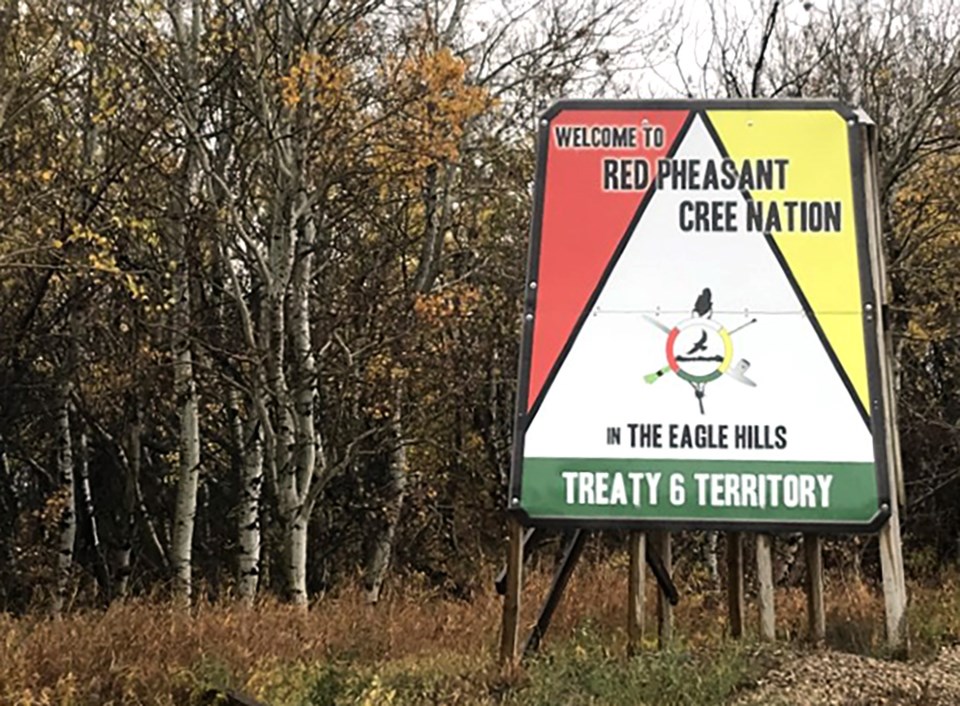RED PHEASANT CREE NATION – Update: Oct. 3: On Monday afternoon a security vehicle parked at the entrance to Red Pheasant Cree Nation could be seen. The person guarding the entrance was asking those entering the First Nation where they were going and what was the purpose of their visit. The security personnel asked that their vehicle not be photographed.
Original story: The leadership of the Red Pheasant Cree Nation has declared a state of emergency in response to the escalating drug problem in their community after seven people overdosed in one day.
The First Nation is concerned about the increased violence and how it affects the safety of their people, they said in a media release issued Saturday by FSIN. Many residents are living in fear and are reluctant to cooperate with the RCMP because they fear retaliation.
“We must do something, and this is our first step; our leadership is taking urgent measures to address the drug problem in the community,” said Chief Lux Benson.
“We can’t handle it ourselves,” Austin Ahenakew Red Pheasant spokesperson told SASKTODAY.ca in a phone interview Saturday morning. “We're asking for help. We're looking for help wherever we can get it. It's a big problem. The solutions are out there. We need to be pointed in the right direction. I think everybody needs to do their part. We don't want this to fall on deaf ears. This is our call for help.”
Ahenakew said the First Nation has been dealing with a drug problem for at least 20 years but the seven overdoses in one day was a wake-up call.
“We have our own pandemic that we’ve been dealing with for a long time. It used to be more alcohol and drugs became more prevalent over time.”
Chief Benson said the leadership has issued a warning to evict the residents of houses where drug activity is suspected.
“We will disconnect utilities and board up the doors and windows. The drug problem in our community is a serious and complex issue that requires a coordinated and effective response from various stakeholders.”
Chief Benson said one of the key partners they need is the RCMP who have the mandate and expertise to enforce the law and disrupt the supply of illicit substances.
“We urge the RCMP to step up and help us address this challenge by increasing their presence, resources, and collaboration,” said Chief Benson.
Likewise, Ahenakew said they don’t have their own dedicated tribal police force and need the RCMP’s help.
“We can be proactive and try to shut down a drug house but there are people inside of those houses that we don’t know if they have guns, do they have knives? We can talk about it all we want but at the end of the day we don't have that ability to go into a house, we would give authority to the RCMP to do that.”
Ahenakew added that in the past, the chief and council have tried to rid bad characters from the First Nation.
“Our Band Council resolutions don't mean a whole lot (to them) so we're left without a police force to help us make our communities safe. They (RCMP) help on an emergency basis for the most part. It's tough to deal with the drug problem.”
Chief Benson said most overdoses could be attributed to addictions and mental health issues and they are calling on the federal health minister and the provincial government to sit down and discuss how they can deliver a healthcare strategy to their First Nations that will work.
“We call on all our leaders to act now and save lives. Red Pheasant believes these actions are necessary to protect the Treaty and the inherent rights of First Nations people and to ensure their health, well-being, and dignity.”
Ahenakew said their members need better addictions treatment options and both the provincial and federal government need to provide more treatment centres.
“We don’t feel there’s enough. When we have a parent or a member looking to come off drugs it’s not easy to get them a bed and into detox.”
Long wait lists for them only complicate the situation, said Ahenakew, adding that when someone is ready to get treatment, he/she needs a place right away to detox and get professional help.
“We need to give them a place to go and a better place for their family to get by while they’re gone,” he added.
They also need a lot of support when they get out of treatment.
“Aftercare is important,” said Ahenakew. “They can’t just get thrown back into the into the wild and be expected to stay sober.”
Ahenakew said the chief and council will meet on Monday for further discussions and likely bring back the security they had during the COVID-19 pandemic.
“We have partners that we think can help. If we all come to the table, I think hopefully we can come up with solutions.”
Ahenakew said the seven people who overdosed are recovering and he’s not certain what drug they had taken.
Story updated with comments from Austin Ahenakew.
Don't count on social media to deliver your local news to you. Keep local news a touch away by bookmarking SASKTODAY.ca's homepage at this link.
to bookmark our Crime, Cops and Court section.
Here's why you should bookmark your favourite



